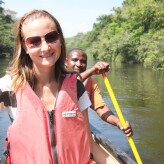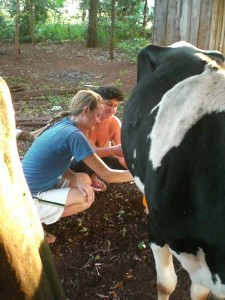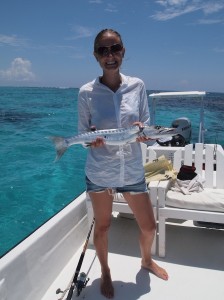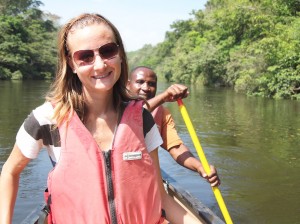How I got started in freelance travel writing

In 5th grade, a travel writer came to visit my class in rural Wisconsin. He talked about spending francs in Paris and exotic Africa. Some of my classmates seemed bored, longing for recess, but I was enthralled. Better still, he was paid to write about his experiences. I’d never heard the term travel writer before that day. To me, it was a small miracle that such a career even existed. I vowed I would grow up and become a travel writer. Of course, reality and fear eventually kicked in around high school. I pushed aside the idea of travel writing as a childhood dream, something only a few lucky people could do. I went to college to study social work and considered myself fortunate that I’d been able to study abroad twice.
Fate intervened. Before graduation, I rekindled another forgotten childhood dream: The Peace Corps. Without my social work degree, I never would have been accepted and sent for two years to work with youth in Paraguay.
Long term volunteering abroad
Peace Corps was where I began to hone all the skills I now rely on as a “professional traveler”. Beyond learning Spanish and a few swear words in the indigenous language of Guarani, I figured out that people in other countries aren’t dangerous. I learned to stay in strangers’ homes, eat their food, and talk to them. I figured out how to use public transportation, deal with stomach upsets, and prevent my stuff from being stolen. I learned that even when the worst things happen, (like the time I got diarrhea in prison), I could bounce back and turn it all into a great story. I got used to being homesick, expecting the unexpected, and going with the flow. I searched out the unusual and the overlooked because that is where all the good stories are.
Travel writing began to creep back into my consciousness. But fear still reigned. I would never be a good enough writer. I was a good traveler; I had proved that in Peace Corps and then on a subsequent trip to Southeast Asia and China. But maybe, just maybe, I could write a travel memoir about Peace Corps and Paraguay?
Learning to write about my travels
I did a surreptitious Google search for “travel writing courses” and came across MatadorU, a program offered by the publishers of Matador Network, one of the largest travel magazines. The more I researched the program, the more I liked it. MatadorU was backed by National Geographic Traveler and had laid the courses out in an approachable way. It looked like I could take the course from anywhere in the world, which was good, because I was finished with Peace Corps and essentially homeless. I’d been accepted to a graduate program for social work in New York City, but wasn’t sure I wanted to go. Again I had to choose between pursuing my dream of becoming a travel writer, or relinquishing it in favor of a safer, more conventional path.
I signed up for MatadorU thinking I could learn a lot about travel writing for my book before proceeding to grad school, without any plans for trying to become a freelance writer. The first thing I had to do for MatadorU was set up a WordPress blog. I loved how easy this new platform was, but I was so terrified of someone stumbling upon my (bad) writing that I used a fake name, “Mega Woo”. With each week’s lesson, my skills – and confidence – began to grow. I wrote a piece about being married in the Peace Corps and was absolutely shocked when a Matador editor emailed me and offered to buy the piece for Matador. A few weeks later I was invited on a press trip in Cabos, Mexico. Then I sold another piece. I was doing it, I was travel writing!
Ever wish you had a good friend who was already established as a travel writer, and could show you the ropes and introduce you to the editors, press agents, and publishers you’d need to know to succeed?
 Matador Networks’ Travel Writing Program is run by one of the largest travel publishing companies—the very same companies you’ll need to pitch to launch your career.
Matador Networks’ Travel Writing Program is run by one of the largest travel publishing companies—the very same companies you’ll need to pitch to launch your career.
Unsurprising then that some of the most successful travel writers got their start studying with this course. It will teach you everything you need to know to launch your career as a travel writer. But more importantly, the contacts you make there will open doors to getting those all-important first published bylines.
Becoming an official freelance travel writer
But I still had that pesky graduate school admission to think of. I moved to New York City and found a walk-up on the Lower East Side. I sat in my window every night until three, writing. I went to the grad school orientation and looked over my class list, but my heart wasn’t in it. I contacted the school and deferred my application. Then I told my parents. They weren’t surprised. Neither was I. I started pitching like mad, realizing I wouldn’t be able to count on student loans to pay my rent. I had to take jobs babysitting and work as a coat check attendant. I didn’t care. I was completely free to do what I wanted for the first time in my adult life. The 5th grader inside of me was so proud.
Still, the 27 year-old with the student loans and Manhattan rent was a little nervous. And occasionally a little voice would ask, ‘who do you think you are?’ I ignored it. I went to the New York Times Travel show with an editor from MatadorU and met the publicists who worked with the Belize Tourism Board. I was on a short list to become a writer-in-residence in Belize. The publicists were very impressed with my Peace Corps experiences. A week later, I signed the contract. I’d be traveling in Belize for three months and writing about my experiences. I found a subletter for my apartment, packed a backpack, and tracked down that travel writer who’d inspired me in 5th grade. I owed him a huge thank you.
Read MoreThe freelance travel writer lifestyle

Freelance travel writing is, without doubt, the dream job. You get to explore the world, describe new experiences and spend time writing, all in the hours that suit you. But like any occupation, while it’s very rewarding, it can come with a few challenges. So if you’re considering travel journalism as a career, have a think about the kind of lifestyle it entails to decide if it’s definitely the thing for you.
The travel writing rollercoaster
There’s no denying that being a freelance travel writer can lead to some thrilling – and occasionally all-expenses-paid – adventures. Even interns sometimes get free trips to exotic destinations. You’ll have to write about them of course, you can’t sunbathe the whole time! Some writers can find themselves in tricky situations, for example deciding to review a hotel or location that wasn’t quite up to scratch.
And while there’s plenty of excitement in the freelance travel writer lifestyle, much travel journalism can be a little on the mundane side. You’ll find yourself taking commissions to write about the different types of cabin on a cruise ship, or tips on how to book tickets for musical performances. If this still inspires you to pick up your pen, then you might just be cut out for this career!
Timing it right
Ask any freelancer travel writer what they love most about their way of life and they will say the flexibility to work when they want. There’s nothing like choosing hours to suit you; taking a long lunch break or working on a Sunday so you can visit friends mid-week, or adjusting your working hours to look after your family.
However, to achieve this fine balance, you will need to be motivated. When you work for yourself, you will need to make yourself sit down at the desk and get on with things without a nudge from anyone. Some people can find this difficult. You’ll need to be very organised, keeping accounts for tax purposes, generating and chasing invoices, and managing your time efficiently. If you don’t know how to do this already, after a few months of being a freelancer there’ll be no stopping you!
From solitary travels to a people jungle
Writers tend to be introverts by nature. We like to wander alone, musing over our thoughts and spending time in our own private space, writing down our ideas. There’s no doubt that the freelance travel writer lifestyle can be solitary at times. Even if you have a partner or a family, you’ll sometimes have to travel alone for a commission and you’ll get used to spending time away from home in order to do your research and writing on location.
This can be hard for everyone, including natural introverts, so you and your loved ones will need to find ways of staying in touch and managing in your absence. Luckily, access to the internet is prevalent in all but the most remote locations. If you haven’t discovered it yet, sign up to Skype for free or low-cost video calling.
On the other hand, freelance writers will be faced with lots of different people in their day-to-day working lives and you’ll need a charming side to manage everyone’s (often conflicting!) expectations. You will have to deal with pushy editors changing your copy and public relations staff wanting you to write about particularly boring things. But for a lot of freelance travel writers, this is all part of the fun!
Despite all the pros and cons, there is no denying that a freelance career can be extremely satisfying, and as challenging as you want to make it. The world’s your oyster, so give it a go!
Read MoreWhat I Love About Being a Freelance Travel Writer

Like other freelance writers, I’ve always felt a slight feeling of nausea at the thought of working a nine-to-five job. Every day I wake up and go to my desk knowing that my creativity and articulation are the only things paying the bills. Although it can be a little frightening – especially during tax time – I find it exhilarating to watch the day unfold on my own terms. If a story isn’t making sense on paper, I just go for a hike or take a stroll to a local café and try again. If, at three AM, I get a great idea for a story, I send a quick e-mail to an editor and wake up the next morning to a brand new assignment.
Perhaps the biggest perk of being a travel writer is the license for guilt-free adventure. Whether it’s dancing with a local señorita or performing “detective work” at a neighborhood pub, being a travel writer gives you permission to experience each destination to its fullest. Contrary to popular belief, readers can sense when a writer is padding a story or using fluff clichés. I’ve heard more than one editor remark about tossing stories in the waste bin as soon as they see stock phrases such as “quaint”, “nestled”, or “resembling cardboard cutouts”. In other words: you have to truly experience the place you’re writing about if you want to write a good story.
As a freelance travel writer, your job is to find new places and tell new stories in a way that stains the reader’s imagination and makes them long to go where you’ve gone. I love this. It’s why I get out of bed in the morning. And because it’s nearly impossible to write an accurate, engaging story without experience, it forces me to get my head out of the guidebook and pay attention.
Which brings me to another reason why I love freelance travel writing. More than any other type of journalism, travel writing actually requires you to have a good time. I once tried to write a story about a weekend trip I spent in Dublin on the way to a writer’s conference. Due to logistical issues, I found myself constantly on the phone with conference staff and had no time for exploring the city. I was so preoccupied that I barely had a sip of Guinness in the airport before boarding my flight to Mali. Later, when I tried to write about my trip to Dublin, all I could summon were descriptions on how dreary the rain was.
One of my favorite trends in travel journalism is the recent boom in “experience tourism”. More and more readers are wanting stories about places that engage them both physically and mentally, with activities like ecotourism, volunteer work, and immersion. Instead of playing the role of tourist bystander, modern travelers are yearning to become important to the places they go. For me, this means even more opportunities to break the surface and connect with different people and their cultures. My favorite example of this is a week I spent volunteering at a work camp in Aix-en-Provence, France, that involved piecing together old Roman walls that had been buried for five centuries. After a day’s work everyone would reconvene on the patio for a bottle of du vin rouge while sharing our stories around a small fire pit. In addition to learning hands-on skills in masonry and excavation, my French vocabulary doubled, and I made some lasting friendships with the locals and other volunteers.
Thanks to conferences such as the annual New York Times Travel Show, travel writers can now talk directly with representatives of the tourism boards for different countries. Since practically every country profits from tourism, most travel shows have representatives just waiting to accommodate writers who can tell their story. One of my favorite aspects of travel writing is taking assignments from developing countries located in Africa, South America, Asia, or Eastern Europe. Since most readers are unfamiliar with these countries, you start to feel like you’re in unchartered territory. Why?
Because every travel writer and their cousin has written some blurb about cafés in Paris or coffeehouses in Amsterdam. But I don’t know anyone who’s written about, say, competing in an axe-throwing tournament in the Scottish Highlands, or witnessing a 2,000-year old shamanic ritual on an island in Lake Baikal, Russia. As a travel writer, you get paid to find that unique place or story and fully experience it with all your body.
And then comes the writing. With all of the allure and adventure of the job, it’s easy to forget that travel is only half of the job title. Being a travel writer means spending hundreds of hours crafting paragraphs and searching for the right words. It means sitting at your desk and revising stacks of pages for synapse and imagery, trying to find the best way to tell your stories. Fortunately, most successful travel writers have a passion for writing, and tend to find the act of filling pages to be as exhilarating as the traveling itself.
Of all the perks of the travel writer’s life, the writing is undoubtedly my favorite. It makes you see places and people in a different light, and keeps you searching for new ways to express yourself. As Natalie Goldberg famously said, writers live twice: experiencing each place one time in the flesh and another time on paper. I can’t imagine a better way to live.



